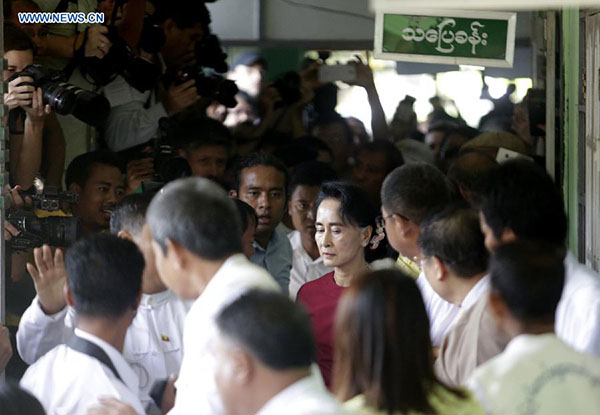 |
|
Chairperson of the National League for Democracy (NLD) Aung San Suu Kyi (C) arrives to cast her vote during the general elections at a polling station in Yangon, Myanmar, Nov. 8, 2015. Myanmar's multi-party general election began across the country Sunday morning at 6 a.m. (local time) with 33.5 million eligible voters starting to go to polls and cast votes at respective polling stations. [Photo/Xinhua] |
YANGON - Myanmar's multi-party general election began across the country Sunday morning at 6 a.m. local time with 33.5 million eligible voters starting to go to polls and cast votes at respective polling stations.
In Yangon, eligible voters started queuing in front of polling stations in respective townships one hour before the clock struck six for ballot casting.
The 2015 general election is the second held in Myanmar after the previous military government handed over the state power to a civilian government in 2011 through the first election in 2010.
The election is being held under the secret polling system and closely monitored by more than 10,000 local and international observers.
A total of 6,038 candidates involving 91 political parties and 310 independent runners are competing for more than 1,000 seats at three levels of the parliament in the election.
Of the total, 1,733 candidates are to run for seats of the House of Representatives (Lower House), 886 for the House of Nationalities (Upper House), 3,419 for Region or State Parliament.
The Union Election Commission designated 1,150 constituencies for the vote at three levels of the parliament across the country. Of them, 323 constituencies will be contested for the House of Representatives, 168 for the House of Nationalities, 630 for the Region or State Parliament and 29 for ethnic representatives.
Competitively strong parties go to the ruling Union Solidarity and Development Party (USDP), led by U Htay Oo, and the opposition National League for Democracy (NLD), led by Aung San Suu Kyi.
USDP fed 1,122 candidates, while NLD fielded 1,123 for the run for seats at all three levels of the parliament.
USDP chairman U Htay Oo himself will run the election in Ayeyawaddy region's Hinthada township constituency for a seat of House of Representatives, while U Shwe Mann, current speaker of the Union Parliament and House of Representatives, will compete in Bago region's Phyu township constituency for the same seat, and U Khin Aung Myint, current speaker of House of Nationalities, in Mandalay constituency-8 for a seat of House of Nationalities.
Other key current state leaders and ministers taking part in the election as candidates of USDP include two vice presidents Dr. Sai Mauk Kham and U Nyan Tun and three ministers at the President's Office for seats of Lower House, while other two ministers at the President's Office are to run as independents for seats of the Upper House.
Moreover, some key retired military personnel taking part in the election as USDP candidates include former Defense Minister Wai Lwin, Chief of Special Operation Hla Htay Win and Minister of Border Area Htet Naing Win for seats of Lower House.
NLD chairperson Aung San Suu Kyi will herself compete in Yangon region's Kawhmu township constituency for a seat of House of Representatives and she was also signified by her first ever personal vote casting in her residential constituency of Bahan township in Yangon.